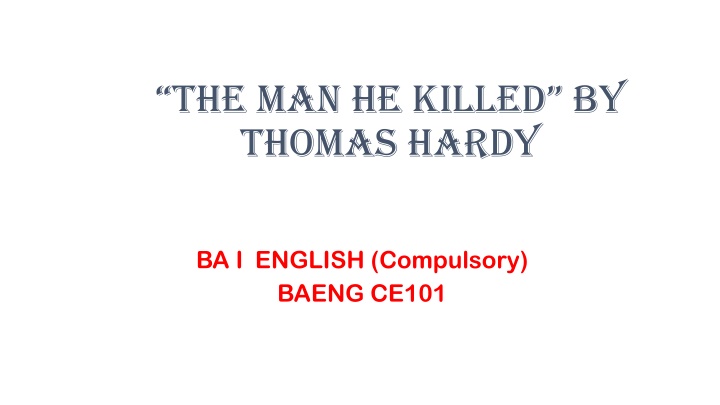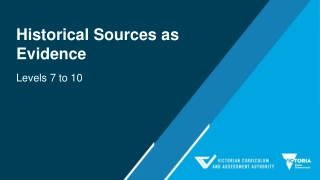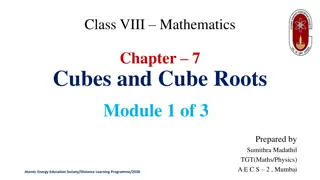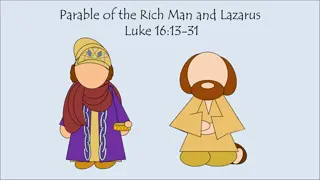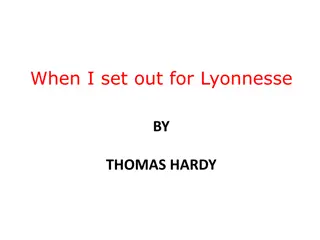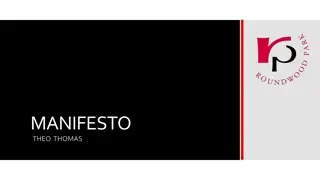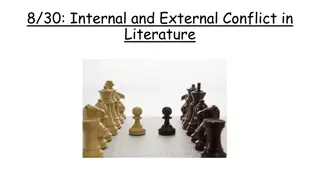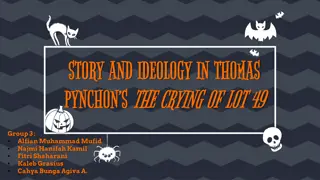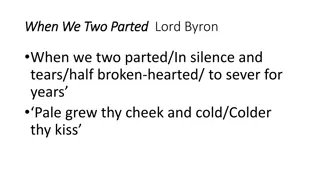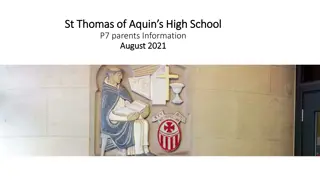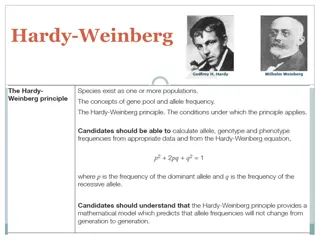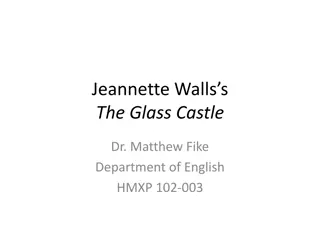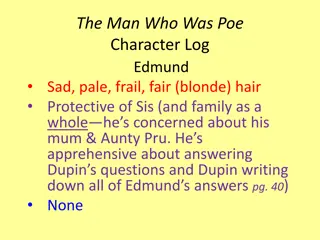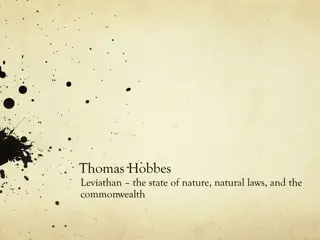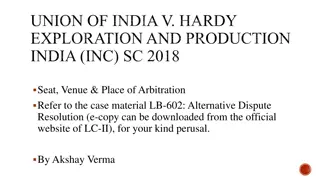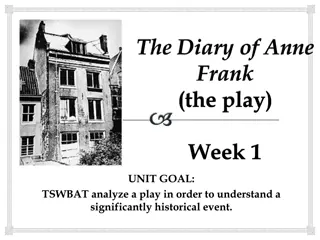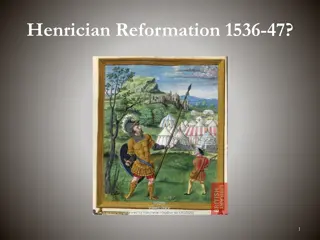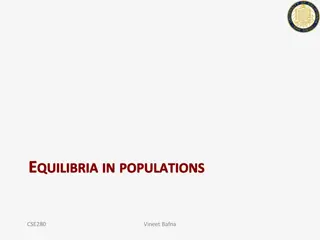Analysis of "The Man He Killed" by Thomas Hardy and Its Historical Context
Thomas Hardy's poem "The Man He Killed" explores the senseless nature of war through the perspective of a soldier who reflects on killing an enemy soldier whom under different circumstances, they could have shared a drink with. Set during the Second Boer War, the poem highlights the arbitrary nature of conflict and the dehumanization that occurs in the context of war. Through simple yet powerful language, Hardy provokes contemplation on the futility of violence and the common humanity shared between individuals caught up in opposing sides. The poem delves into themes of regret, empathy, and the tragic consequences of war, leaving readers with a poignant reflection on the impact of conflict on human relationships.
Download Presentation

Please find below an Image/Link to download the presentation.
The content on the website is provided AS IS for your information and personal use only. It may not be sold, licensed, or shared on other websites without obtaining consent from the author.If you encounter any issues during the download, it is possible that the publisher has removed the file from their server.
You are allowed to download the files provided on this website for personal or commercial use, subject to the condition that they are used lawfully. All files are the property of their respective owners.
The content on the website is provided AS IS for your information and personal use only. It may not be sold, licensed, or shared on other websites without obtaining consent from the author.
E N D
Presentation Transcript
The Man he Killed by Thomas Hardy BA I ENGLISH (Compulsory) BAENG CE101
The Man He Killed by Thomas Hardy (1840-1928) English Novelist and Poet English Novelist and Poet Thomas Hardy was born in Dorset County, England, where he studied architecture, but he later quit to pursue a literary career. In order to gain financial stability, Hardy first published novels, including classics such as Tess of the D Urbervilles and Jude the Obscure. Once he was well known and well off financially, he returned to poetry, his first love. Hardy s dark, bleak verse was at odds with his Victorian contemporaries who tended to present more optimistic view of life.
Prelude to the Poem Prelude to the Poem Second Boer War was fought from 1899-1902 between the British Empire and the Afrikaans-speaking settlers of two independent Boer republics, the South African Republic (Transvaal Republic) and the Orange Free State. It ended with a British victory and the annexation of the republics by the British Empire. Many factors contributed to the war, but the most compelling cause was the struggle over control of the rich gold reserves at the Witwatersrand.
Had he and I but met By some old ancient inn, We should have sat us down to wet Right many a nipperkin! The speaker begins by talking about an unnamed man. The title of the poem suggests that the poet is talking about the man whom he has killed. It seems that the poet is talking about two men meeting up by chance and sitting down for a drink together. The speaker is saying that if he had met that unnamed man under normal circumstances, rather than on the battlefield, at places such as an inn or bar, they probably would have shared drinks and would have had a memorable time. Nipperkin in the last line refers to a liquor vessel or container having a capacity of a half pint or less.
The Man He Killed Summary of Stanza 2 But ranged as infantry, And staring face to face, I shot at him as he at me, And killed him in his place. In the stanza, we finally become aware of that unnamed man. He was a soldier and both the speaker and this unnamed soldier were on the opposing sides of a war. The word But in the first line brings the reader back into the reality where the speaker locates himself and the other soldier on the battlefield. The words ranged and infantry clearly tell us that both these men have the lowest ranking in the army and are lined up in ranks by their superiors for the battle in a way that they could look right at each other. The speaker describes how both of them shot at each other at the same time but it was the soldier from the opposing side who succumbs to the bullet which means the speaker shot his opponent down
The Man He Killed Summary of Stanza 3 I shot him dead because Because he was my foe, Just so: my foe of course he was; That s clear enough; although In this stanza of the poem The Man He Killed , the speaker says that he killed the other man because he was his enemy but the break in the first line indicates the speaker s hesitation and doubt about his action. The repeated use of because indicates that the speaker is trying to come up with a reason or an explanation for why he killed the other man. It appears that the speaker is not really comfortable with what he has done and so is trying to convince himself that he has done the right action by shooting the man as he was his foe. The word although indicates that the speaker wants to consider all possibilities rather than settling for his unconvincing justification
The Man He Killed Summary of Stanza 4 He thought he d list, perhaps, Off-hand like just as I Was out of work had sold his traps No other reason why. In this stanza, the poet says that he had enrolled himself in the army just like that without too much thinking. Similarly, he feels that the soldier he shot could have joined the enemy army maybe because he was out of work, maybe he was in real need of money or just like that. This stanza shows that killing, injuring or fighting was not there in the minds of both these men and the speaker didn t go for a war with a desire to kill the man. However, he has now killed the man and is not able to explain this to himself why he has done
The Man He Killed Hardy s Point of View The Man He Killed deals with the futility, or pointlessness, of war. It is told from the point of view of an ordinary working-class soldier, who is reflecting on the idea that the man he killed in battle probably had a lot in common with him. The idea of having a drink together suggests a sense of brotherhood between the ordinary soldiers. The lack of conviction in the narrator s voice about the necessity of killing the enemy man emphasizes the idea that the soldiers who fight just follow orders, rather than knowing what it is they are doing. It is generally thought that the speaker is a soldier who has just returned from the Boer War, and that he is talking in the pub with his friends. The poem was originally published with a line setting the scene in a particular inn in Dorset.
The Man He Killed Hardy s Point of View By focusing on one soldier's story, Hardy forces us to confront the fact that, in war, one man has to look another man in the face and kill that man. That's what's at stake here, and for Hardy that's what really matters. That may sound obvious, but it's an easy fact to forget in this day and age, when we don't always have to look each other in the face. Wars are often fought in far off places, and with new technology like drones, satellites, etc., it's often hard to remember that war always has and always will have a human cost. Men and women die at the hands of other men and women. Somewhere, someone made a choice that made that happen
The Man He Killed Figurative speech: Tautology Tautology is a repetitive use of phrases or words which have similar meanings. In simple words, it is expressing the same thing, an idea or saying two or more times. It lays emphasize or stress- it brings out the importance of an idea or theme. Examples from the poem- Some old ancient inn. We .us Ranged .infantry Yes quaint and serious war is Quaint, curious, strange
Figurative speech: Inversion Changing the order of words for rhyming or other dramatic, or poetic effects. Interrogative sentences and exclamatory sentences are often inverted with the verb placed before the subject. Examples of inversion in the poem: Had he and I met Sat us down My foe off course he was.. .If met where any bar is
THANK YOU! THANK YOU!
